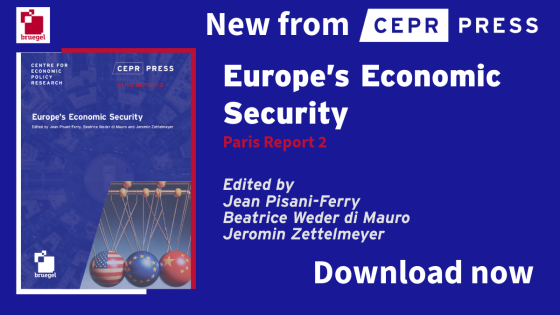
EUROPE'S ECONOMIC SECURITY: Navigating Unprecedented Challenges in a Shifting World
New Report from CEPR and Bruegel Highlights Urgency for Comprehensive Reassessment of EU Strategy
Search the site

New Report from CEPR and Bruegel Highlights Urgency for Comprehensive Reassessment of EU Strategy
In the wake of seismic shifts in the global economic landscape, the Centre for Economic Policy Research (CEPR) and Bruegel present the second Paris Report, titled "Europe's Economic Security." This timely publication addresses the urgent need for Europe to confront and navigate the complex array of challenges threatening its economic stability and security.
“The world has changed. The age of unfettered globalisation, systemic convergence and increasing cultural understanding is over and is probably not coming back in the foreseeable future,” notes the report, “Instead, fault lines are opening across multiple dimensions… [demanding] a comprehensive reassessment of the EU's economic-security strategy.”
The report is edited and introduced by leading CEPR economists, Jean Pisani-Ferry (Bruegel, PIIE and CEPR), Beatrice Weder di Mauro (Geneva Graduate Institute, INSEAD and CEPR), and Jeromin Zettelmeyer (Bruegel and CEPR), with five papers contributed by an eminent group of European and US economists, and identifies three critical factors reshaping Europe's economic security:
To address these challenges, the report underscores the importance of a multifaceted response, including:
"The new global geoeconomics map may necessitate an EU pivot toward economic security, even beyond the pivot that has already happened," states the report. "But economic security must not become an excuse for protectionism, and it must preserve international cooperation."
The report concludes with a call for innovative policy instruments, joint preparedness, contingency planning, and stronger governance mechanisms at both the EU and international levels to safeguard Europe's economic security in an increasingly uncertain world.
1: How to de-risk: European economic security in a world of interdependence | Jean Pisani-Ferry, Beatrice Weder Di Mauro, Jeromin Zettelmeyer
2: Industrial policy in the shadow of conflict: Lessons from the past | Morgan Kelly, Kevin O'Rourke
3: Identifying European trade dependencies | Isabelle Mejean, Pierre Rousseaux
4: What if? The effects of a hard decoupling from China on the German economy | David Rezza Baqaee, Julian Hinz, Benjamin Moll, Moritz Schularick, Feodora Teti, Joschka Wanner, Sihwan Yang
5: Trade policy, industrial policy, and the economic security of the European Union | Chad Bown
6: Instruments of economic security | Conor McCaffrey, Niclas Poitiers